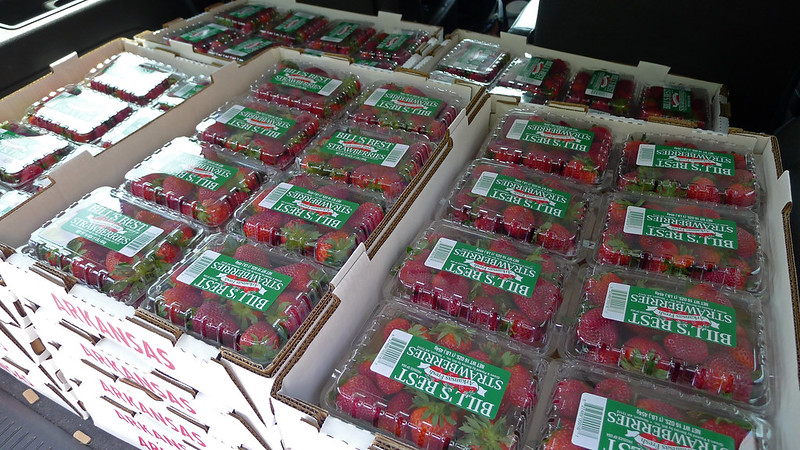April 8, 2020
Local farm produce safe to buy, safe to eat
By Tracy Courage
U of A System Division of Agriculture
Fast facts
- Produce growers offer drive-through, pre-packaged, pre-order and delivery options
- Farmers, producers adapt markets to supply customers fresh produce options, at a distance
- Arkansas produce remains safe, healthy food option; no evidence of COVID-19 transmission through food
(577 words)
(Download this story in MS Word format here.)
LITTLE ROCK — Strawberry season has arrived and with it a whole new way of purchasing farm goods. Amid the coronavirus pandemic, farmers are finding ways to deliver their goods while minimizing contact between customers.
Many roadside farm stands are offering drive-thrus, where customers can purchase fresh produce without leaving their vehicles. Other stands offer pre-order and delivery options, and some are packaging the produce in advance to minimize handling.
Barnhill Orchards in Lonoke, for example, shifted its operation from a farm stand to a drive-through. Customers can either order online and pick up curbside, or they can order on-site from a menu of produce offerings. With a quick pop of the trunk, produce is loaded into buyers’ vehicles.
On March 26, the state Secretary of Health issued a directive prohibiting gatherings of more than 10 people in any confined indoor or outdoor space. Outdoor food markets are exempt because they are considered critical in ensuring Arkansans have access to healthy food options. At this time, farmers’ markets can sell food products and limited personal hygiene items like soap and handmade masks, but other crafts or goods are not to be sold. Cooking demonstrations, crafts, entertainment — and other activities that draw crowds — have been put on hold.
While many Arkansans are willing to wait a little longer in line for a flat of fresh strawberries, a few buyers have worried about food safety.
“I have had calls from people who want to know if it’s safe to buy locally grown food or fresh-picked produce - or any produce - that is handpicked,” said White County Extension Agent Sherri Sanders.
The answer, in short: yes.
“Locally grown produce is a benefit since it doesn’t have to go through so many handlers to get to the end-user,” Sanders said. “Our farmers already follow strict food safety requirements, long before COVID.”
Strawberries are one of the more labor-intensive crops because they must be handpicked and hand-packed.
“Based on what we know about how the virus is spread, consumers should understand that it is unlikely that you would contract COVID-19 by eating produce that has been touched by someone,” said Dr. Amanda Philyaw Perez, assistant professor and food systems and safety specialist.
Coronaviruses are generally thought to be spread from person to person through respiratory droplets. Currently, there is no evidence to support the transmission of COVID-19 associated with food, according to the Centers for Disease Control and Prevention.
However, it is now known that the virus can survive on a surface for two to three days, and the surface type can affect the time of survival. It is important to follow good hygiene practices, such as washing your hands after handling food products, and double efforts to clean and sanitize surfaces that have come into contact with food packaging.
All fruits and vegetables should be washed with cool water. Additionally, cooking produce eliminates the need for worry as well, though half of fresh strawberries and blackberries are eaten raw.
Some guidelines for when you visit farmers markets and roadside stands:
- Stay at least 6 feet away from others.
- Ask your local producer about pre-order and delivery options to minimize time out in public.
- Avoid touching your face until you are able to wash your hands.
- Clean and sanitize surfaces that come into contact with food packaging.
To learn more about produce safety, contact your local Cooperative Extension Service agent or visit www.uaex.uada.edu. For COVID-19 resources, visit uaex.uada.edu/COVID19. For local food resources, visit uaex.uada.edu/localfoods.
About the Division of Agriculture
The University of Arkansas System Division of Agriculture’s mission is to strengthen agriculture, communities, and families by connecting trusted research to the adoption of best practices. Through the Agricultural Experiment Station and the Cooperative Extension Service, the Division of Agriculture conducts research and extension work within the nation’s historic land grant education system.
The Division of Agriculture is one of 20 entities within the University of Arkansas System. It has offices in all 75 counties in Arkansas and faculty on five system campuses.
Pursuant to 7 CFR § 15.3, the University of Arkansas System Division of Agriculture offers all its Extension and Research programs and services (including employment) without regard to race, color, sex, national origin, religion, age, disability, marital or veteran status, genetic information, sexual preference, pregnancy or any other legally protected status, and is an equal opportunity institution.
# # #
Media contact:
Tracy Courage
Director, Communications Services
U of A System Division of Agriculture
Cooperative Extension Service
(501) 671-2126
tcourage@uada.edu
